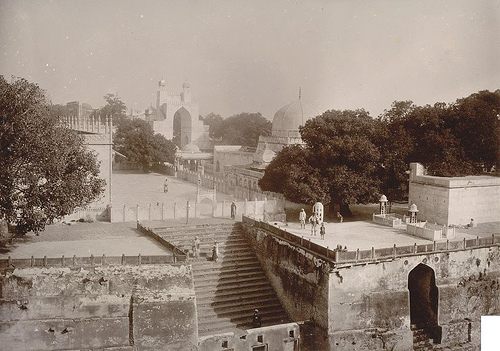Category Archives: Sacramento
Alastu Bi-Rabbikum–Am I Not Your Lord?
The following is taken from Session 1 (Faith) of the Anees ul-Arwah–The Malfuzat of Khwaja Uthman Haruni (rehmatullahi alyhe)–as recorded by Khwaja Moinuddin Chishti (rehmatullahi alayhe)
Then the khwaja (master), may God have mercy on him, said “I saw written in the Umdat us-Suluk of Junaid Baghdadi, may God have mercy on him, as related by khwaja Yusuf Chishti, may God have mercy on him, that when Allah, Exalted is He, said “Alastu Bi Rabbikum (Am I Not Your Lord)”, all the spirits, believer and non-believer, were immediately divided into four categories:
- Those spirits that on hearing their Lord’s call fell into sajdah (prostration) replying with heart and limb, “Balaa (Indeed)!”
- Those that made sajdah but didn’t do so with any sincerity.
- Those that believed sincerely with their hearts only.
- Those that didn’t care to reply–neither with heart nor limb.
The khwaja, may God have mercy on him, then clarified each category.
The spirits that replied Balaa (Indeed You are our Lord and Sustainer!) with heart and limb (in prostration),  became Prophets (upon them all be peace), Saints, and sincere believers. The second category that said balaa but without any sincerity are those Muslims who forsake their religion on their death-beds. The third category that said nothing but sincerely meant it are those who were disbelievers but later turned to Islam. The last category who didn’t say anything nor have any sincerity to accept the call are those who live and die as disbelievers.
After articulating all of this, the master became engrossed in his dhikr (remembrance of God) and the one in need of his prayers returned to where he came from–all praises to God for that (lesson).
Translated by Sharaaz Khan
9 Rajab 1432 Hijri
The Prayer of the Aspirant
The following is taken from the Anees ul-Arwah–The Malfuzat of Khwaja Uthman Haruni (rehmatullahi alyhe)–as recorded by of Khwaja Moinuddin Chishti (rehmatullahi alayhe)
He (Khwaja Uthman Haruni rehmatullahi akyhe) once said, “O Seeker!  Call out the takbeer (Allahu Akbar) in the same manner as I have, as its place is between the two eyebrows and the chest and have certainty that God is watching you and that both my feet are on the Siraat (the bridge over which each human being must successfully cross to enter Heaven). On my right side is Heaven and on my left the fire of Hell. Then call out Allahu Akbar and with complete concentration and presence of mind, recite the the Quran al-Hakeem. Enter into the position of bowing (ruku’) with absolute submission and presence of heart. In prostration (sajud) lose yourself in (Allah)–the state of Istighraaq–then sit (in juloos) and recite the greetings (atahiyyaat).  As long as you remain in this state until you complete (with salaam), the angels will seek forgiveness for you from Allah–Most High.â€
He then said, “Then eat from lawful food and lawful earnings and wear of lawful clothing. Make tauba (pleading to God for the forgiveness of past wrong and evil deeds) your second nature . And when you do so, the seven doors of Heaven will be opened for you. Your prayer will be accepted.â€
Then he said, “Reciting the Qur’an oft and repeatedly is what washes sins (kaffara or expiation) and there is a veil between the Fire and the one who recites. For such a reciter, the door of Heaven is opened  and from every letter (of every word) he recites, an angel is born. When this angel recites the Quran this person will receive its reward. The closeness to God is achieved through recitation and teaching of the Holy Qur’an.
It is incumbent upon you to recite the Qur’an, so learn. The Messenger of God (upon him be peace and blessings) said, “The one who recites one verse of the Qur’an, in his book of deeds is written the reward of all deeds. The one who dies loving the recitation and teaching of the Qur’an is presented by an angel the gift of a pear from his Lord. The fire of the grave nor the fire on the Day of Standing will touch the one who recites the Qur’an from its beginning to end. He will be the neighbor of the Prophets (upon them all be peace) in Heaven.
At this he ended his words and all the people left and all praise belongs to Allah.
Translated by Sharaaz Khan.
8 Rajab 1432 Hijri















